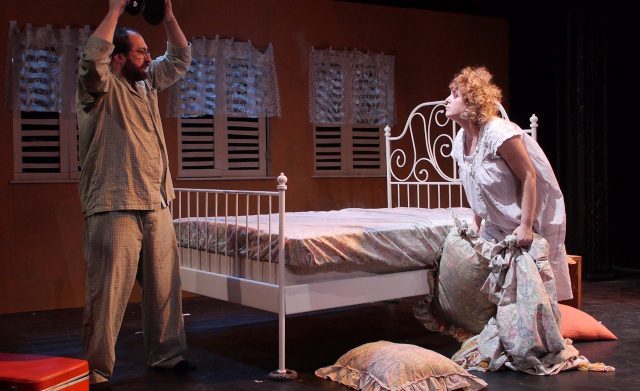
Yona Popoch (Gera Sandler) has had it with wife Leviva (Ronit Asheri-Sandler) in The Labor of Life
Theater at 224 Waverly
224 Waverly Pl. between Eleventh & Perry Sts.
Through March 29, $25 for one show, $45 for two, $65 for three, $75 for all four
866-811-4111
www.newyiddishrep.org
Perhaps New Yiddish Rep needs to take a break and catch its collective breath. The Jersey-based company was founded in 2013 to promote classic and contemporary Yiddish theater. It burst out of the gate with well-reviewed adaptations of Waiting for Godot in fall 2013 and the Drama Desk–nominated Death of a Salesman in fall 2015. (Sandwiched in between was a pair of one-act plays by Wolf Mankowitz.) But in the mere span of six months, New Yiddish Rep has staged a disappointing Rhinoceros, a lovely Awake and Sing!, and now the lackluster double bill Hanoch Levin Squared, two one-acts by the celebrated, controversial Israeli playwright who passed away in 1999 at the age of fifty-five. Levin was loved and hated for his political and religious satires (Hefez, The Dreaming Child) and triangular dramas (Yaakobi and Leidental, The Rubber Merchants); his works earned major prizes and were banned. New Yiddish Rep is currently performing Levin’s seventy-minute The Labor of Life and eighty-minute The Whore from Ohio in repertory at the Theater at 224 Waverly, both in Hebrew and in Yiddish, with English surtitles. I saw them both in Yiddish on the same night, and while each had its moments, they were far too workmanlike, losing the many nuances of Levin’s biting wit and sarcasm, instead played much too straightforward. The Labor of Life, from 1989, is directed by Ronit Muszkatblit (Hanna and the Moonlit Dress, Nature of Captivity) and stars Gera Sandler as Yona Popoch (played by Yosi Sokolsky in the Hebrew version) and Ronit Asheri-Sandler as his wife, Leviva. (Sandler and Asheri-Sandler are married in real life.) They’ve been married for thirty years, but Yona has had it and is ready to leave her. “I’m ruined,” he says. “How did it all melt away?” While Yona blames Leviva for his unhappiness, she blames him. “There’s no place for you to escape because wherever you go, you drag yourself with you,” she proclaims. It all takes place in, on, and around their bed (the sets for both plays are by Nathan Rhoden), where love does not seem to exist anymore, if it ever did. They are visited in the middle of the night by Gunkel (Eli Rosen, who translated both plays from Hebrew into Yiddish), who’s not exactly welcome in their home right then but sits down on the bed nonetheless and shares his fears of dying alone. Taking stock of his sad life, he says, “All in all, nothing but a Gunkel.” After Gunkel finally leaves, Yona cries, “We’re all Gunkels.” It’s a play about relationships, but none of the characters make any kind of connection with one another or the audience.

Bitterman (David Mandelbaum) and son (Eli Rosen) are thwarted by a prostitute in Hanoch Levin’s The Whore from Ohio
There’s a little more life in 1997’s The Whore from Ohio, directed by Obie winner Michael Leibenluft (I’ll Never Love Again, The Subtle Body), but it too fails to hit the key notes and also becomes a repetitive tale involving a trio of strange bedfellows. The raggedy Bitterman (New Yiddish Rep artistic director and cofounder David Mandelbaum) wants to celebrate his seventieth birthday by sleeping with a prostitute, in this case, Bronatsatski (Mary Black, played by Vered Hankin in the Hebrew version), who says she will let him do her in the dank, graffiti-laden yard for one hundred shekels. He haggles for a better price, but she is not budging. “What about a symbolic price?” he asks, offering her ten shekels, which she curtly refuses. “Just as I thought. There’s no respect for symbolism in the world anymore,” Bitterman opines. Eventually, he gives in, but his member has trouble getting started, complicating their arrangement. And it gets even more complicated when Bitterman’s grown boy, Bitterson (Rosen), shows up, defending his father and demanding his money back, which Bronatsatski is not about to do. Again, there’s lots of back and forth, discussions that should symbolize socioeconomic issues in Israel, the United States, and elsewhere but instead seems to just be about a son fighting for what he insists his father is due. “That hole will be locked up for good someday,” Bitterson tells Bronatsatski. The language in both plays can be surprisingly crude — however, you can’t hear the Yiddish word “tuches” enough — but it’s all too right-on-the-nose, lacking the symbolism that is in Levin’s words. Even at seventy and eighty minutes, both plays are too long, too tiresome, not offering the insight into the human condition that was so central to Levin. In the end, what we’re really left with are a couple of Gunkels.